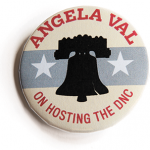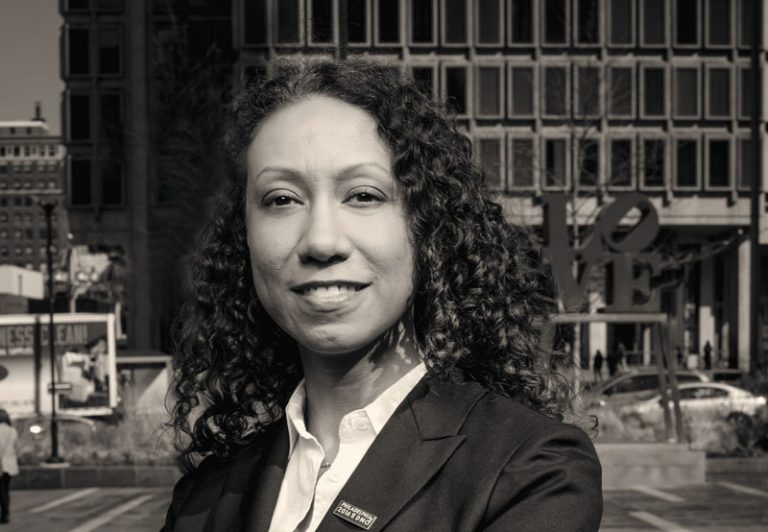On July 25, 6,000 delegates and up to 44,000 guests will pour into Philadelphia to anoint a Presidential nominee at the 2016 Democratic National Convention.
That’s the size of the crowd for a typical Rittenhouse Square festival or an Eagles game, says Angela Val ’94, the deputy executive director for the 2016 DNC Host Committee.
“But there isn’t as much hoopla around [those events],” she shrugs.
For the past 16 months, the Drexel hospitality grad has been busy coordinating much of that hoopla: She’s assisted in overseeing the booking of 15,000 hotel rooms; she’ll manage the particulars of seven major DNC-related events, helping to oversee the deployment of 10,000 volunteers, and she’ll ensure convention visitors enjoy exploring Philadelphia in between political panels, meetings and, of course, voting for the nominee.
“The biggest thing for us is that the city shines,” she says, noting that the event will be broadcast live during prime time nationally and internationally and that roughly 20,000 members of the media will be in attendance.
Some might consider managing 50,000 people’s perceptions of a city a tall order, but Val isn’t concerned. Philadelphia hosted the Republican National Convention in 2000, she says, plus Pope Francis’ visit last fall went extremely well.
“What I’m not worried about is knowing that Philadelphia’s ready and prepared for this,” she says.
‘STUCK IN TIME’
Val’s confidence in Philadelphia is the product, perhaps, of having personally helped the city become a high-caliber destination. When the Maryland native started at Drexel in 1990, she never intended to stay after graduation. She wanted to work in hospitality, but Philadelphia was a city that closed early, with few hotels or shops and a creaky transit system.
“I didn’t understand how this city could be this large, and it was stuck in time,” Val recalls.
At the time, airport hotels had higher occupancy rates than their Center City counterparts. There was no Marriott. The six most expensive city hotels (the Ritz-Carlton, the Four Seasons and the Bellevue, among others) routinely discounted their rooms, resulting in an average daily rate of $127, according to a 1993 Philadelphia Inquirer article.
Val spent her free time in college visiting more hospitality-rich cities like Washington, D.C., and New York. She made a good impression at her first co-op, with the Bethesda–based hotel management rm Hospitality Partners; there, she mostly manned the front desk of a D.C. Embassy Suites hotel.
But the next year, Hospitality Partners was hired to manage a new Embassy Suites off the Ben Franklin Parkway in Philadelphia. The $10 million overhaul of a shuttered Radisson Suites Hotel kept Val working in Philadelphia for the remainder of her co-ops. When graduation rolled around, she landed a job in the hotel’s sales department.
Val says she stayed in Philadelphia to be with her Drexel friends in five-year programs, but she also sensed a shift in the city’s hospitality industry. “They were trying to make this more of a destination,” she says.
The $523 million Pennsylvania Convention Center opened in June 1993. Its debut was accompanied by Mayor Ed Rendell’s first Welcome America!, a $3.6 million, 11-day festival with appearances by Bill Clinton and Nelson Mandela that brought 500,000 people to the Parkway for Fourth of July reworks. It was the largest crowd the city had seen since Pope John Paul II’s 1979 visit. More attention-grabbing events were to follow.
“By the end of 1995,” Val says, “stuff was starting and I was like, ‘This is going to be an easier place for me to find a job, because this industry is just getting of the ground here.’”
She made strides concurrent with the city. She became sales manager, then transferred to the hotel’s catering department, where she was promoted to director after just a few months.
Then, in 1997, just as Val returned from a trip to Korea, the Embassy Suites was sold. Val remembers coming back from vacation to find her office belongings packed up on a bellman’s cart.
But the hotel’s outgoing general manager, J. Mickey Rowley, had a place for her. He was still employed by Hospitality Partners, which retained an events space in the top two floors of the office tower at 1717 Arch Street. Rowley had to choose one employee from his staff to help build a business for that facility, dubbed Top of the Tower.
“And I selected Angela,” Rowley, Val’s mentor to this day, remembers. “There was something about her dedication to the company that made me think, ‘She’s the best person to go out on this journey and take a little bit of risk.’”
Together, Rowley and Val rolled the cart from the Embassy Suites hotel to the building now known as Three Logan Square, where they set to work establishing Top of the Tower as a prominent catering venue.
Though it was a risk on Val’s part, it was methodical: “When we wheeled that luggage cart of goods into Top of the Tower,” Rowley says, “she made it clear, ‘I will do this for a year.’ She had the wisdom even then.”
Around the same time, Rowley was appointed executive director of the Philadelphia Hotel Association, which also demanded his focus. Val remembers feeling overwhelmed.
“When there are just a couple of employees, you’re everything: You’re the bottlewasher, you’re the accountant, you’re the tour guide, everything,” she says. She went to Rowley with her concerns, and he helped her look for another position.
He eventually introduced Val to Meryl Levitz, the former head of the Philadelphia Visitors Center who the city had tapped in 1996 to lead the newly formed Greater Philadelphia Tourism Marketing Corporation (GPTMC) — a $12 million experiment to see if organized marketing could boost Philadelphia’s status as a tourist destination. Levitz hired Val in 1998 as her executive assistant.
“I couldn’t believe that I would go from doing my own thing and being in charge of it to basically doing administrative work,” Val says. “But it was how I was going to get my foot in the door, and so I did it.”
State and city dollars, along with a grant from the Pew Charitable Trusts, subsidized the GPTMC for its first three years until it proved itself; after that, a 1-percent increase to the city’s hotel tax gave it stable funding. Rowley says the nonprofit’s creation, and its success, is arguably the most significant hospitality event in Philadelphia’s history. “That was a whole new branding,” he says. “It was incredibly creative.”
And Val became a major player in the organization. By mid-1999, Levitz appointed her hotel program director (she was the sole employee in the department at the time), a role that would evolve, especially after 9/11.
Prior to 9/11, GPTMC had focused its efforts mainly on advertising Philadelphia outside of the area. But after the terrorist attacks tourists were dissuaded from flying. The GPTMC responded by marketing the city to locals. “We realized we had an audience we weren’t tapping into,” Val says. “There were so many who just lived maybe 20 minutes away who had not been downtown in years.”
PHILLY’S NIGHT TO SHINE.
 “What I’m not worried about is knowing that Philadelphia’s ready and prepared for this,” says Angela Val.
“What I’m not worried about is knowing that Philadelphia’s ready and prepared for this,” says Angela Val.
The GPTMC’s $1.6 million “Philly’s More Fun When You Sleep Over” ad campaign helped to book 36,000 hotel rooms that winter.
“It changed how people saw our company,” Val says. “What we did became more noticeable, and we got to partner with more people locally because they got what we did.”
As GPTMC — renamed Visit Philadelphia in 2013 — grew from seven employees to 55 and gained more attention through popular campaigns like its valentines to visitors (“With love, Philadelphia XOXO”), Val rose through its ranks. She was promoted to vice president of special projects in 2003 and chief external affairs officer in 2014.
In her last role there, she was assigned to work on Philadelphia’s bid for the 2016 Democratic National Convention. That’s when Kevin Washo, executive director of the DNC Host Committee, rst encountered Val. It didn’t take long to designate her the committee’s No. 1 draft pick, he says.
“It was pretty clear right out of the gates that Angela was a superstar,” Washo says. “We had her in our sights for a while.”
SHOWTIME
When Philadelphia successfully landed the DNC bid in February 2015, the Host Committee o ered Val a job and she accepted, even though it means she’ll be out of a job when the DNC wraps up.
“I knew I wanted this job right away,” she says. She had volunteered during the 2000 Republican National Convention, and the prospect of working for the DNC Host Committee in Philadelphia — a Democrat-dominant city — was a dream come true. “I felt that was what my career was building up to,” she says.
Washo says Val’s marketing and hotel experience complements the mostly government-based backgrounds of the other 11 staff members on the commit- tee. “She knew a whole different side of Philadelphia than we did,” he says. “Honestly, if you’re out with her, you’re not going to go to a place where she’s not going to know one person.”
That connectedness surely makes the Point Breeze resident more likely to remain in Philadelphia after her stint with the host committee ends. But she’s also witnessed the city flourish first- hand over the past three decades, thanks in part to her own work. Its restaurant and hospitality industries have thrived, as has its reputation elsewhere.
“My friends used to make fun of me for living here,” she says. “They don’t anymore. They get it.”
ANGELA VAL’S SHORTLIST FOR DNC VISITORS:
1. “Everybody is going to want to try all of our wonderful sandwiches and then be pleasantly surprised by all of the other restaurants and culinary talent that we have here in the city. You can literally eat your way through everything.”
2. “Find yourself a beer garden, because it is really special to Philadelphia, these pop-up destinations.”
3. “Go sit along the Schuylkill someplace and watch the sun go down.”
4. “Get into some neighborhood and go to a corner bar or small family restaurant, because at the end of the day that’s what Philly’s really about.”



